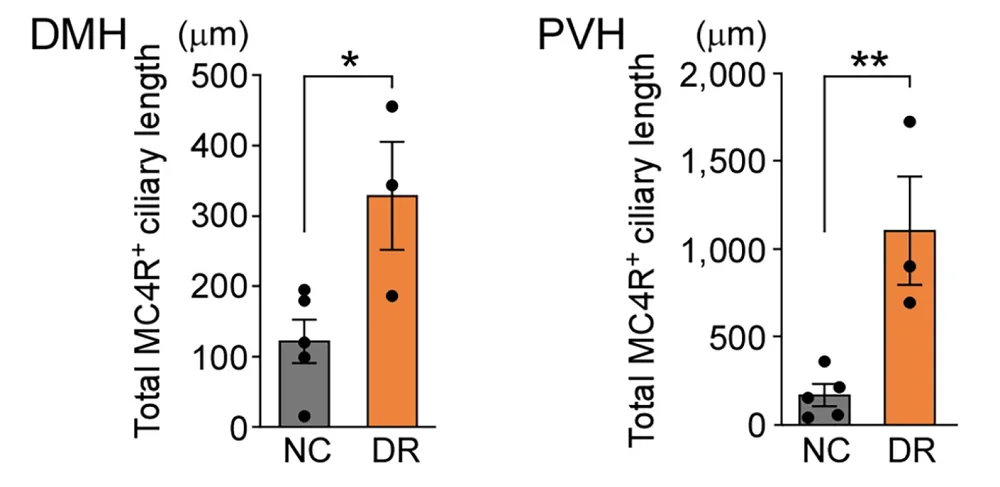Scientists Discover a New Mechanism of Age-Related Obesity
- Signaling changes cause hunger to increase.

A new study suggests that the reason why aging is associated with obesity lies in specific neurons found in the brain [1].
Tell that to the brain
It is often hard to lose weight, and it becomes harder with age. While it seems simple enough to eat less, signals in the brain are telling people to eat more. Modern science is starting to understand that it is, in fact, all in the head, but in a very particular way.
In a new study published in Cell Metabolism, researchers from Nagoya University in Japan investigated an important player in anti-obesity signaling in the brain: melanocortin-4 receptor (MC4R). This protein is expressed in a subset of hypothalamic neurons, and genetic deficiencies in the gene that codes for it result in overeating and obesity in rodents and humans [2].
Shorter cilia equal fat
The scientists discovered that MC4R resides in primary cilia, the tiny hairlike protrusions from neuronal bodies. These are not to be confused with axons, which are much bigger and longer and are mainly involved in conducting electrical impulses. Primary cilia, which can also be found on other cell types, are sensory organelles that detect and respond to chemical and mechanical stimuli. In neurons, primary cilia regulate various processes related to the cells’ development and function. MC4R-positive primary cilia were almost exclusively found in two specific hypothalamic regions, DMH and PVH.
The researchers found that MC4R in primary cilia transfers signals that increase energy expenditure via thermogenesis in brown adipose tissue (BAT). More importantly, MC4R-positive primary cilia seemed to shorten with age, almost disappearing in old obese rats. Primary cilia that did not contain MC4R were spared from this fate. MC4R molecules were evenly distributed along cilia length, meaning that cilia shortening results in a proportional decline in MC4R signaling.
Putting rats on a high-fat diet seemed to accelerate MC4R-positive cilia shortening, while 40% caloric restriction strongly inhibited it. MC4R-positive cilia were the longest soon after weaning, when young rats have the fastest metabolism to help them generate enough heat. As the animals grow, their surface-to-mass ratio decreases, along with their energy demands per gram of weight; the same thing happens to humans. Cilia length was negatively correlated with body fat content in all animals.
The researchers then knocked down MC4R expression specifically in those two hypothalamic regions via RNA interference. This did not have cytotoxic effects and affected only MC4R-positive neurons. As a result, MC4R-positive primary cilia were significantly shortened even in young rats. This led to both lower oxygen consumption (indicative of lower energy expenditure) and to higher food intake. Unsurprisingly, the treated rats had increased body weight and fat content.
The leptin connection
Leptin is a hormone primarily produced by adipose tissue (fat cells) that plays a crucial role in regulating energy balance, body weight, and metabolism. Leptin is upstream from melanocortin, and it helps maintain energy balance by communicating the body’s energy status to the brain. When leptin levels are high, it acts on melanocortin, promoting satiety.
Excessive adiposity can trigger leptin resistance when leptin levels are “stuck” high, making the body insensitive to the hormone. Leptin resistance, increased adiposity, and weight gain are all associated with aging [3]. The researchers wanted to know how the mechanism of cilia shortening that they had discovered relates to leptin resistance. Leptin injections suppressed appetite in wild-type rats but not in MC4R-deficient rats, suggesting that shortening of MC4R-positive cilia can be a cause of leptin resistance.
There is also a silver lining: the researchers found that dietary restriction robustly regenerates short MC4R-positive cilia in aged rats, possibly due to reduced leptin-melanocortin signaling. This suggests that the age-related predisposition to obesity is not permanent and can be reversed by lifestyle interventions.

“We believe that a similar mechanism exists in humans as well,” said Professor Kazuhiro Nakamura, the lead author of the study. “We hope our finding will lead to a fundamental treatment for obesity.” But even before the pill is developed, according to Nakamura, “moderate eating habits could maintain MC4R-positive cilia long enough to keep the brain’s anti-obesity system in good shape even as we age.”
Literature
[1] Oya, M., Miyasaka, Y., Nakamura, Y., Tanaka, M., Suganami, T., Mashimo, T., & Nakamura, K. (2024). Age-related ciliopathy: Obesogenic shortening of melanocortin-4 receptor-bearing neuronal primary cilia. Cell Metabolism.
[2] Yeo, G. S., Farooqi, I. S., Aminian, S., Halsall, D. J., Stanhope, R. G., & O’Rahilly, S. (1998). A frameshift mutation in MC4R associated with dominantly inherited human obesity. Nature genetics, 20(2), 111-112.
[3] Sasaki, T. (2015). Age-associated weight gain, leptin, and SIRT1: a possible role for hypothalamic SIRT1 in the prevention of weight gain and aging through modulation of leptin sensitivity. Frontiers in endocrinology, 6, 153289.








